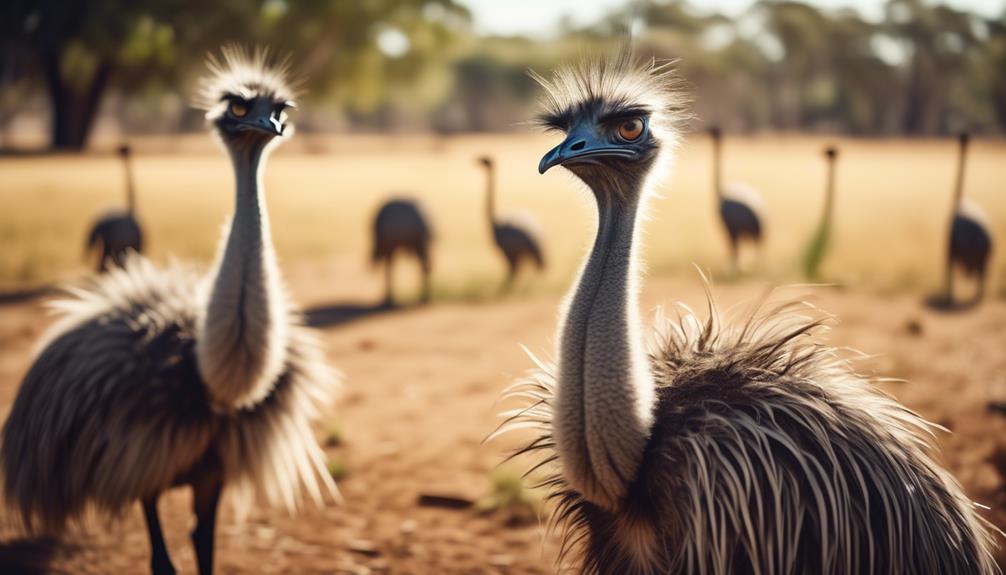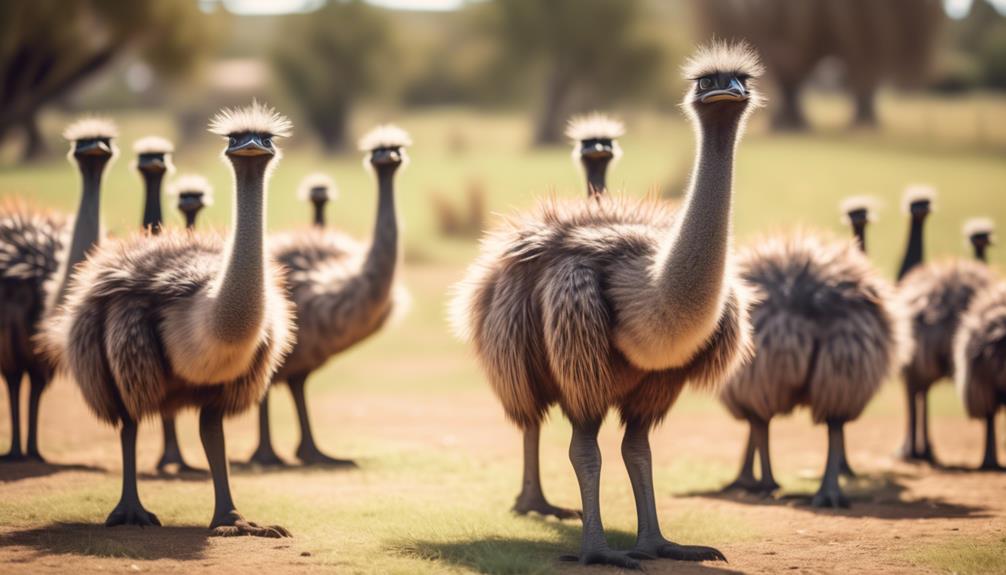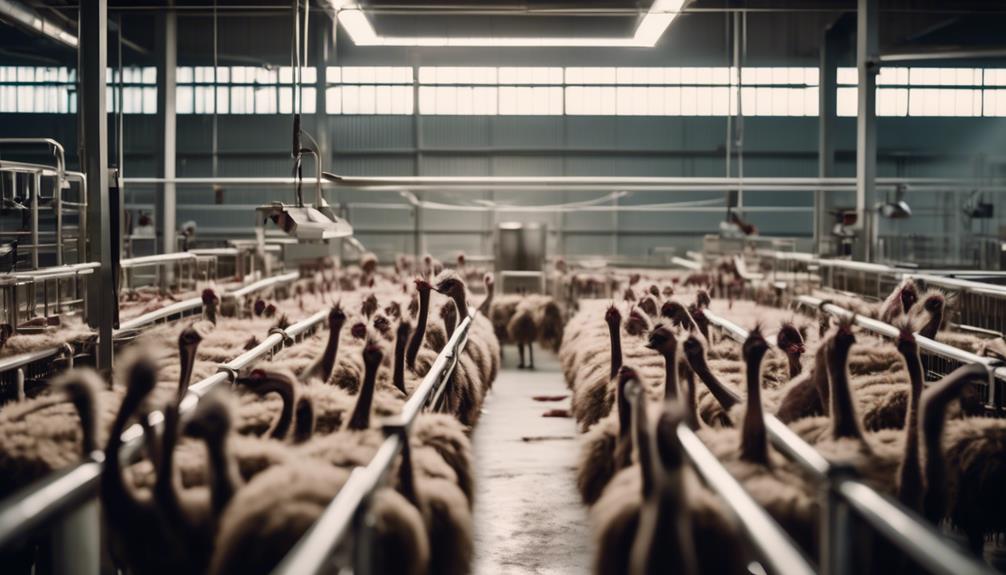
Are you curious about the ethical implications of emu farming?
As you delve into the world of emu farming, you'll come across a myriad of considerations that warrant your attention. From the welfare of emus in captivity to the environmental impact of the industry, there are thought-provoking questions that need to be addressed.
Additionally, the use of antibiotics and growth hormones, as well as the methods of slaughter and processing, raise concerns about animal welfare and the transparency of the emu industry.
Join us as we explore these ethical considerations and shed light on alternative farming practices that may offer a more sustainable and compassionate approach.
The Welfare of Emus in Captivity

Emu welfare in captivity is a complex issue that demands a compassionate, analytical, and balanced approach to ensure the well-being of these remarkable birds. Emus, much like their wild counterparts, have certain natural behaviors that must be taken into consideration when they're kept in captivity. Understanding and respecting these behaviors is crucial for their physical and psychological health.
Emus are naturally curious and intelligent creatures that require ample space to explore and roam. In captivity, they should be provided with enclosures that allow them to exhibit their natural behaviors, such as foraging, dust bathing, and socializing. Emus are also known to form strong social bonds, so it's important to keep them in small groups to prevent loneliness and stress.
To address these concerns, emu farming regulations have been put in place to ensure the welfare of these birds. These regulations cover various aspects, including enclosure size, diet, veterinary care, and handling techniques. They aim to provide emus with a suitable and enriching environment that allows them to express their natural behaviors.
Environmental Impact of Emu Farming
Considering the holistic impact of emu farming, it's crucial to assess the environmental consequences that arise from the cultivation and management of these remarkable birds. Emu farming, like any agricultural practice, has both positive and negative effects on the environment. Here are four key environmental impacts to consider:
- Emissions reduction: Emus produce less greenhouse gas emissions compared to traditional livestock such as cows or pigs. This is due to their unique digestive system and low methane production. Emu farming can contribute to reducing the overall carbon footprint of the agricultural industry.
- Land degradation: Emu farms require large areas of land for grazing and roaming. If not properly managed, this can lead to soil erosion and degradation. Responsible land management practices, such as rotational grazing and reforestation, can help mitigate this impact and ensure the long-term sustainability of emu farming.
- Biodiversity conservation: Emu farming can coexist with native flora and fauna, preserving biodiversity on farmlands. By maintaining natural habitats and practicing sustainable farming methods, emu farms can provide a haven for various plant and animal species.
- Water usage: Emus have low water requirements compared to other livestock. Their ability to thrive in arid conditions reduces the strain on water resources. However, it's still important for emu farms to implement efficient water management practices to minimize water usage and maintain a sustainable balance.
Genetic Diversity and Breeding Practices

To ensure the long-term health and viability of emu farming, it is essential to carefully manage genetic diversity and implement responsible breeding practices. Selective breeding plays a vital role in maintaining and improving the overall quality of emus. By selectively mating individuals with desirable traits such as strong immune systems, high fertility rates, and good temperament, farmers can create a healthier and more productive population of emus.
Conservation efforts are also crucial in preserving the genetic diversity of emus. Emu farming should prioritize the protection and preservation of rare and endangered genetic lines. This can be achieved through initiatives such as maintaining separate breeding populations and avoiding excessive inbreeding. By doing so, farmers can contribute to the overall conservation efforts of emus and ensure the long-term survival of these magnificent birds.
Here is a table highlighting the importance of genetic diversity and responsible breeding practices in emu farming:
| Importance of Genetic Diversity and Responsible Breeding Practices |
|---|
| – Ensures long-term health and viability of emu farming |
| – Improves overall quality of emus through selective breeding |
| – Preserves rare and endangered genetic lines |
| – Contributes to conservation efforts of emus |
| – Ensures the long-term survival of emus |
Use of Antibiotics and Growth Hormones
Maintaining the health and well-being of emus in farming operations requires careful consideration of the use of antibiotics and growth hormones, ensuring responsible practices that prioritize the welfare of these magnificent birds. When it comes to the use of antibiotics and growth hormones in emu farming, it's essential to strike a balance between promoting health and preventing the overuse of these substances.
Here are four important factors to consider:
- Responsible use: Emu farmers should only use antibiotics and growth hormones when necessary, following proper dosage and administration guidelines. This helps minimize the risk of overusing these substances and the potential development of antibiotic resistance.
- Veterinary supervision: It's crucial to involve veterinarians in the decision-making process regarding the use of antibiotics and growth hormones. They can provide expert advice on the specific needs of the emus, ensuring the responsible and appropriate use of these substances.
- Alternative practices: Emu farmers should explore alternative practices to reduce the reliance on antibiotics and growth hormones. This may include implementing preventive measures such as proper nutrition, hygiene, and biosecurity protocols to minimize the need for these substances.
- Monitoring and surveillance: Regular monitoring and surveillance of emu health can help identify and address any potential health issues promptly. This proactive approach can reduce the dependence on antibiotics and growth hormones by allowing early intervention and preventive measures.
Slaughter and Processing Methods

Emu farming practices must prioritize humane slaughter and processing methods to ensure the welfare and ethical treatment of these remarkable birds. When it comes to the slaughter of emus, ethical concerns and consumer awareness play a crucial role in driving the need for appropriate practices. Emus should be handled with care and respect throughout the entire process, from the moment they're transported to the slaughterhouse until their final moments.
One of the main ethical concerns surrounding emu slaughter is the use of stunning methods. Traditional stunning methods, such as electrical or mechanical stunning, can cause unnecessary stress and pain for the birds. To address this concern, some farms have adopted alternative methods, such as controlled atmosphere stunning, which uses gas to render the emus unconscious before slaughter. This method has been shown to be more humane and reduces the risk of unnecessary suffering.
Furthermore, the processing of emus should also be carried out with utmost care. This includes proper handling, packaging, and labeling to ensure that consumers are aware of what they're purchasing. Transparency and accurate labeling are essential in promoting consumer awareness and allowing individuals to make informed choices about the products they buy.
Transparency and Labeling in the Emu Industry
Ensuring transparency and accurate labeling in the emu industry is essential for promoting consumer awareness and empowering individuals to make informed choices about the emu products they purchase. When it comes to transparency in marketing and consumer education, the emu industry has room for improvement. Here are four key points to consider:
- Clear and Honest Labeling: Consumers have the right to know exactly what they're buying. Emu products should be labeled accurately, indicating the source of the emu and any additives or processes involved. Clear labeling helps consumers make choices that align with their values and dietary needs.
- Traceability: The emu industry should focus on implementing traceability systems to track the journey of the emu products from farm to shelf. This allows consumers to have confidence in the integrity of the supply chain and ensures that ethical and sustainable practices are followed.
- Third-Party Certifications: Independent certifications and labels provide consumers with an easy way to identify products that meet certain standards of animal welfare, environmental sustainability, and ethical practices. These certifications can help consumers make purchasing decisions that align with their values and support responsible emu farming.
- Consumer Education: It's crucial to educate consumers about the emu industry, its practices, and the impact of their choices. By providing accurate and accessible information, consumers can make informed decisions and support ethical emu farming.
Alternatives to Traditional Emu Farming Practices

To explore more sustainable and ethical practices in the emu farming industry, it's important to consider alternative approaches that prioritize animal welfare and environmental sustainability.
Emu farming can be done in a way that minimizes harm to the animals and the environment while still meeting the demands of the market.
One alternative to traditional emu farming practices is the implementation of sustainable farming methods. This involves using organic and natural feed for the emus, avoiding the use of antibiotics and hormones, and providing them with ample space to roam and graze. By adopting such practices, emu farmers can ensure that the birds are raised in a more humane and natural environment.
Additionally, ethical treatment of emus can be achieved by placing a strong emphasis on their welfare. This includes providing them with proper veterinary care, ensuring that they've access to clean water and suitable shelter, and avoiding any unnecessary stress or harm. Emu farmers can also prioritize the birds' mental well-being by implementing enrichment activities that stimulate their natural behaviors and instincts.
Frequently Asked Questions
How Many Emus Are Typically Kept on a Single Farm?
Typically, on a single emu farm, the number of emus kept can vary depending on the size of the farm and the resources available. Emu farming populations can range from a few dozen to several hundred emus.
What Is the Average Lifespan of an Emu in Captivity?
On average, an emu's lifespan in captivity is around 20 years. This is important to consider when discussing the ethical considerations of emu farming, as it raises questions about the quality of life for these animals.
Are Emus Able to Exhibit Natural Behaviors on Farms?
So you're curious if emus can exhibit their natural behaviors on farms, huh? Well, let me tell you, when it comes to emu welfare and farming practices, there's a lot to consider.
Are Emus Raised for Meat or Other Byproducts?
Emus are raised for both meat and other byproducts, such as feathers. They can be kept as pets, but the fashion trend of using emu feathers raises ethical concerns about the treatment of these animals.
What Types of Regulations Are in Place to Ensure the Ethical Treatment of Emus on Farms?
Emu farming regulations ensure the ethical treatment of emus on farms. Farmers follow guidelines for housing, feeding, and healthcare. Regular inspections and audits help maintain standards. Emus are given proper care and attention, promoting their well-being.
Conclusion
In conclusion, as you navigate the ethical considerations of emu farming, remember that the welfare of these majestic birds should be the top priority.
Just as a delicate feather keeps a bird afloat, our choices in farming practices can either uplift or burden these creatures.
Let's strive for balance, analyzing the environmental impact, breeding practices, and transparency in the industry.
By doing so, we can ensure a future where emus thrive, spreading their wings of compassion and sustainability.




